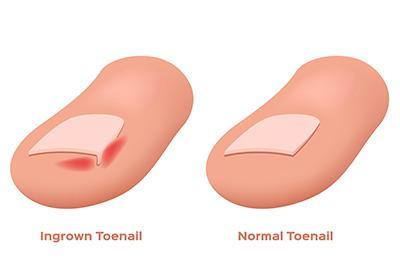Ingrown Toenails: Causes, Prevention, and Treatment

- posted: Feb. 06, 2024
Dr. LaWanda Bailey-Rayner and the team at Foot Care Specialists in Holly Springs, NC, are here to help you find relief from ingrown toenails.
Guide to Preventing and Treating Ingrown Toenails
An ingrown toenail can be a very painful thing to deal with. It means that the nail’s side curls and grows down into the surrounding skin, causing redness, tenderness, and swelling. In most cases, it happens to the big toe but can potentially happen to any of them. They can even impact the toe’s bone if left untreated.
Fortunately, you can both prevent and effectively treat ingrown toenails so it never gets that far. Learn more about how in the guide below from Dr. Bailey-Rayner and the team at Foot Care Specialists in Holly Springs, NC.
What Causes Ingrown Toenails?
There are several things that can lead to an ingrown toenail, including those listed below.
- You cut your nails in a curved manner or too short.
- You stub your toe or sustain another toe injury.
- You wear tight shoes or socks, as they put pressure on the toes.
- Your feet sweat a lot, which makes the skin softer.
- Your nails are thick, which typically happens with age.
Steps to Preventing an Ingrown Toenail
Preventing an ingrown toenail can be a fairly simple process, as you simply need to change habits or adjust lifestyle factors. Learn more below.
- Keep your feet dry. If they sweat a lot, wear breathable socks and shoes. Antifungal powders and sprays, as well as antiperspirants, can be beneficial. Be sure to dry them completely after showering.
- Wear the right shoes. In addition to breathable options, it’s important that your socks and shoes fit you properly. There should be enough room in the toe box that there is no pressure on the toe.
- Trim your nails – the right way. Always cut your toenails straight across and leave some white at the end.
How Is an Ingrown Toenail Treated?
If addressed early enough, an ingrown toenail can typically be treated with foot soaks at home each day. You’ll then need to place a small piece of cotton beneath the nail to encourage it to grow properly. Additionally, it’s best to wear open-toe shoes during this process.
If at-home treatment isn’t working, you’ve had an ingrown toenail for some time, or it’s infected, you’ll need to seek professional care. Medication and less conservative techniques might be required.
If ingrown toenails have made an appearance in your life, visit Dr. Bailey-Rayner and the team at Foot Care Specialists in Holly Springs, NC. You can schedule an appointment by calling (919) 557-0300.





